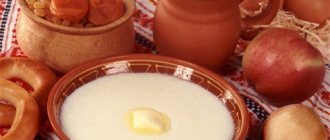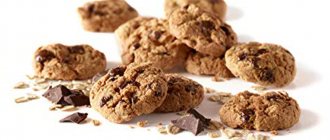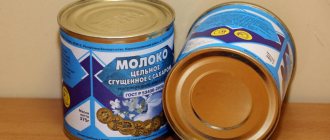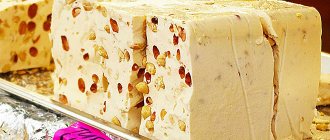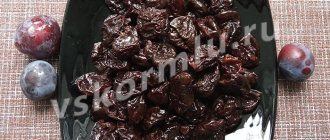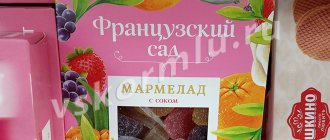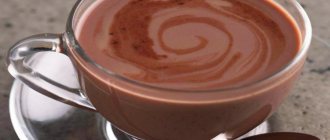Sugar during breastfeeding: benefits and harms
Ordinary sugar contains a lot of calories and energy resources, which make it possible to:
- recover;
- improve mood;
- normalize sleep;
- protect the liver from toxins;
- improve the body’s absorption of vitamins and microelements;
- stimulate brain activity.
By receiving lactose, fructose and glucose with sugar, a woman quickly returns to normal physically and morally. And these substances guarantee full development for the child.
But excessive passion for sweet substances leads to malfunctions in the female body.
Hormonal imbalances begin. The immune system of a nursing mother suffers. Eating large amounts of foods containing sugar leads to tooth decay. And tooth enamel after childbirth is especially defenseless and is often quickly destroyed by sugar. Increased blood glucose levels during breastfeeding are dangerous. Not only the woman, but also the child is at risk of developing diabetes.
Is it possible to use sweeteners during breastfeeding?
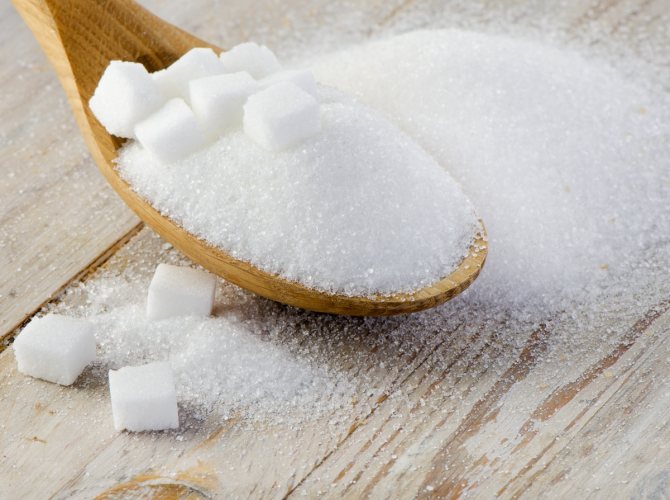
If a woman or her child has contraindications to taking sugar while breastfeeding, then it can be replaced with special sweetener substitutes. But here attention needs to be paid to ensuring that they are natural and do not contain chemicals. If they are consumed in small quantities, they will not cause harm. We place bets on the Asian total according to the strategy and win together with the Resident - a really good strategy. But if the doses are not correct, some sweeteners release toxic substances and can harm the genitourinary system, gastrointestinal tract and other organs, in addition, harm the child.
“Sorbitol” causes diarrhea, “Acesulfame” - disruptions in the cardiovascular system, “Cyclamate” - harms the kidneys.
Which ones to use?
There are many substitutes that are even sold in stores, here are some:
- "Sukrazola". This sweetener contains no calories and does not affect blood glucose levels. Allowed for nursing and pregnant women.
- The sweetener “Aspartame” can be consumed in limited quantities; it is contraindicated in some liver diseases.
- Acesulfame potassium is a sugar substitute that is considered harmless and is found in many products: baked goods, frozen desserts, gelatins and puddings.
During breastfeeding, it is better to replace sugar with natural products that contain it: honey (if the parents are not allergic), apples, carrots, berries, dried fruits - they will not only enrich the body with glucose, but also supply the mother and her baby with vitamins. A natural sugar substitute is stevia, an herb that has natural sweetness. It is produced in the form of tablets and extracts.
What effect does sugar have on a breastfeeding baby?
A child's digestion is so imperfect in the first months of life. Excess sugars obtained from breast milk lead to:
- colic;
- increased gas formation;
- diathesis and allergies;
- heaviness and pain in the stomach.
The appearance of itching, irritation on the baby’s skin, and rashes should not be ignored. If mom consumed a lot of sweets and jam during this period, then it is necessary to urgently exclude sweets from the diet. Carbonated drinks that contain a lot of sucrose are especially dangerous.
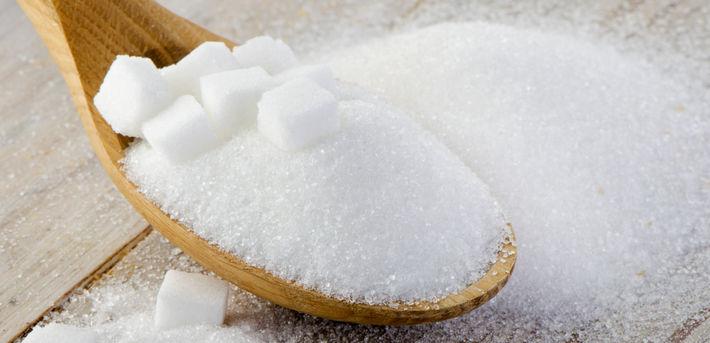
When can it be added to the diet?
After giving birth, a woman often tries to start eating as usual, forgetting that everything will enter the baby’s body through milk. And how he will react to his mother’s nutrition is unknown. Therefore, sugar and products containing it are introduced gradually during the first month.
Sucrose crystals are quickly absorbed into the blood, raising blood glucose levels. Then comes a decline in performance. This is where allergic reactions occur in the baby. You can’t eat too much sweets while breastfeeding, because the baby will cry and have trouble sleeping due to colic in the stomach.
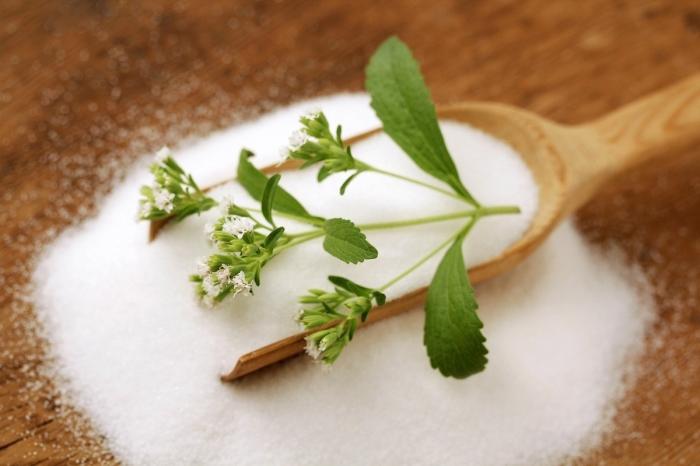
If a reaction to the consumption of sweets does not occur, then gradually include marshmallows, fruits, oatmeal cookies, and juices in the menu.
What sweeteners can you use while breastfeeding?
There is still ongoing debate about what is healthier – sugar or its substitutes.
The first one is unusually high in calories. It negatively affects weight, the condition of teeth and skin, can increase allergic reactions, provoke diabetes and other diseases. And numerous sweeteners, although they contain a minimal amount of calories, are suspected of carcinogenicity. In addition, recently the theory has become widespread that sweeteners also contribute to the deposition of fat by the body.
Many people are trying to switch to sweeteners. However, not everyone knows which of the many types is the safest. And even more so, is it possible for a nursing mother and small children to use a sweetener? We will try to figure this out.
How and when did sweeteners appear?
Classic lump or refined sugar was invented in 1840, and since then, few people can live without these white crystals. The exception is those who are forced to consciously give up sugar due to illness or for personal reasons and reasons. The dangers of sugar are talked about everywhere and constantly. Read more about the properties, benefits and dangers of this product here.
But, having given up sugar, many do not want to part with the sweet taste, and sweeteners come to the rescue. The first sugar substitute, saccharin, was invented in 1885 by German chemist Konstantin Fahlberg. He immediately became such a competitor to his older brother that sugar producers ensured that saccharin was allowed to be sold in pharmacies and only by prescription.
The modern market for sweeteners is extremely diverse. First of all, these are chemical or synthetic compounds that have a taste of varying degrees of sweetness. These are aspartame, cyclamate, saccharin, neotame and others. They are made artificially. However, some are extracted from natural materials and are more natural.
Sugar cane
Much has been written about the dangers of refined sugar. It has long been proven that unlimited consumption of this product provokes the occurrence and development of a number of diseases, such as obesity, diabetes and heart disease. Cane sugar is considered the most common substitute for white sugar.
The energy value of this product is comparable to classic sugar. But cane sugar also contains glucose and fructose, which are easier for the body to digest and therefore slightly better than white sugar. But be careful with the high glycemic index of the product.
This is one of the most natural, best and healthiest products. And at the same time, honey is used as a natural sweetener. Honey is added to tea, baked goods, and used in cooking. It has an excellent taste and is good for human health.
Honey contains a number of vitamins, minerals and other beneficial substances. Just one teaspoon of unpasteurized honey contains over 21 calories, increased amounts of vitamin C, magnesium and other trace elements. However, honey contains a lot of fructose, and a low-quality product can cause severe allergies and botulism, which occurs in young children.
Honey should not be eaten if you have problems digesting fructose, have an allergic reaction, or have an individual intolerance. It is not recommended for women in the first six months of breastfeeding, or for children under three years of age.
Coconut sugar
Coconut sugar is not uncommon today. It appeared after coconut oil appeared on the market. The product is made from coconut palm sap and has virtually no taste. But one teaspoon of such sugar contains a huge amount of minerals, such as phosphorus, magnesium, calcium.
Coconut sugar contains less fructose than white sugar, making it easier for the liver to digest. But experts do not recommend overdoing it with such a sweetener. Still, nutritionists consider coconut sugar to be the best option for replacing beet sugar. At the same time, it maintains a slim figure and has a low glycemic index.
Fructose
It is a natural sugar that is obtained from honey and fruits. This product is characterized by low calorie content, due to which it does not contribute to the appearance of excess weight and deterioration of the condition of teeth. At the same time, fructose is much sweeter than classic sugar. Therefore, the consumption of such a product will be less.
Fructose tones and saturates the body in a short time. It improves immunity and reduces the risk of allergies. Plus, this product does not affect blood sugar levels in any way.
We talked about common types of natural sweeteners. But others are also produced, including stevia, maple syrup and barley malt, and canola molasses.
Are sweeteners harmful?
In 2007, a large-scale scientific study was conducted, the subject of which was 19 previously conducted studies on the dangers of sweeteners. It was found that three of them came to the conclusion that the sweetener increases appetite, three others made the opposite conclusion, and the remaining 13 decided that sweeteners have no effect on it.
At the same time, the argument that sweet taste substitutes provoke the production of insulin, promoting the processing of absorbed food into fat, has not been confirmed.
In addition, it has been established that almost all of the data from these studies were obtained using rats, and it is unknown how applicable they are to the human body.
And the number of these experiments can hardly be called sufficient, since only 27 animals were involved.
Not a single study has proven the carcinogenicity of sweeteners. There is also no evidence that they can cause gastrointestinal upset, diabetes or chronic fatigue syndrome.
However, sweeteners should be used with reasonable caution. It is better to avoid industrial products, as they contain a lot of dangerous chemicals. Let's find out whether children and women with breastfeeding can take sweeteners.
Is it possible to use sweeteners during breastfeeding?
Each sweetener carries certain health risks, but on the other hand, it also has benefits. Of course, this only applies to natural products. When breastfeeding, artificial sugar substitutes that are produced industrially are strictly prohibited. These are sorbitol, aspartame, saccharin and other chemical products.
A small child and a nursing mother can react extremely negatively to industrial sweeteners. Allergies, poisoning, digestive and stool disorders may occur. Often there is heaviness, discomfort and pain in the abdomen. In addition, chemical additives negatively affect internal organs and systems.
A sugar substitute for breastfeeding and for children should be natural and of high quality. In this case, cane and coconut sugar are suitable. When choosing the latter, pay attention that the product should have a shade from dark yellow to light brown. Too dark a color indicates low quality sugar, as it was burnt during manufacturing.
Fructose is suitable for children and nursing mothers. It is also recommended for active people, athletes and diabetics. But you should not take more than 30 grams of fructose per day, otherwise problems with the heart and blood vessels may occur.
In addition, fresh vegetables, fruits and berries containing fructose and glucose are an excellent substitute for sugar. And why sugar is harmful to a child’s body, read the link https://vskormi.ru/children/s-kakogo-vozrasta-mojno-davat-sahar-rebenku/.
Is it possible to use sweeteners during breastfeeding and what is the harm of an artificial product?
After childbirth, a woman’s body needs a lot of energy to recover. And caring for a baby requires strength. Carbohydrates contained in sugar and its substitutes are necessary for breastfeeding. But you need to know about their influence on the child’s body of a newborn. Sometimes natural products are used instead of sugar, which successfully replace sucrose and are beneficial for a nursing mother.
Sugar during breastfeeding: benefits and harms
Ordinary sugar contains a lot of calories and energy resources, which make it possible to:
- recover;
- improve mood;
- normalize sleep;
- protect the liver from toxins;
- improve the body’s absorption of vitamins and microelements;
- stimulate brain activity.
By receiving lactose, fructose and glucose with sugar, a woman quickly returns to normal physically and morally. And these substances guarantee full development for the child.
But excessive passion for sweet substances leads to malfunctions in the female body.
Hormonal imbalances begin. The immune system of a nursing mother suffers. Eating large amounts of foods containing sugar leads to tooth decay.
And tooth enamel after childbirth is especially defenseless and is often quickly destroyed by sugar. Increased blood glucose levels during breastfeeding are dangerous.
Not only the woman, but also the child is at risk of developing diabetes.
What effect does sugar have on a breastfeeding baby?
A child's digestion is so imperfect in the first months of life. Excess sugars obtained from breast milk lead to:
- colic;
- increased gas formation;
- diathesis and allergies;
- heaviness and pain in the stomach.
The appearance of itching, irritation on the baby’s skin, and rashes should not be ignored. If mom consumed a lot of sweets and jam during this period, then it is necessary to urgently exclude sweets from the diet. Carbonated drinks that contain a lot of sucrose are especially dangerous.
How to use while breastfeeding
A woman must learn to eat properly during lactation in order for her baby to be healthy. Sweets should be introduced carefully, monitoring the baby’s condition.
When can it be added to the diet?
After giving birth, a woman often tries to start eating as usual, forgetting that everything will enter the baby’s body through milk. And how he will react to his mother’s nutrition is unknown. Therefore, sugar and products containing it are introduced gradually during the first month.
Sucrose crystals are quickly absorbed into the blood, raising blood glucose levels. Then comes a decline in performance. This is where allergic reactions occur in the baby. You can’t eat too much sweets while breastfeeding, because the baby will cry and have trouble sleeping due to colic in the stomach.
If a reaction to the consumption of sweets does not occur, then gradually include marshmallows, fruits, oatmeal cookies, and juices in the menu.
Permitted rate
You don’t need to completely stop drinking sucrose, but you should drink tea with 1-2 teaspoons no more than 3 times a day. Foods high in carbohydrates are essential in the diet. But here they monitor the baby’s body’s reaction to them. Therefore, the permitted consumption rate is different for everyone, strictly individual.
Mommy needs to keep a diary, write down what sweets she eats and how much. Be sure to make a column where they record how the child reacts to the mother’s nutrition during breastfeeding. All sweet products are subject to accounting. After all, bakers include sucrose in baked goods and cookies.
In total, a woman during lactation needs 30 grams of sugar per day. This amount is equal to 6 teaspoons. In the first months of life, if the norm is not followed, the baby may develop allergies. And it will be more difficult to cure her.
Should you give up sugar completely?
A fully breastfeeding woman refuses sweets when her baby:
- severe allergic reaction;
- colic occurs regularly;
- High blood sugar may be inherited.
When close relatives are struggling with diabetes with insulin injections, it is necessary to protect the baby by reducing sucrose consumption to a minimum.
Women trying to bring their body weight back to normal after childbirth should give up sweets and starchy foods.
Source: https://diabetlab.ru/pitanie/kakie-saharozameniteli-mozhno-pri-grudnom-vskarmlivanii
Permitted rate
You don’t need to completely stop drinking sucrose, but you should drink tea with 1-2 teaspoons no more than 3 times a day. Foods high in carbohydrates are essential in the diet. But here they monitor the baby’s body’s reaction to them. Therefore, the permitted consumption rate is different for everyone, strictly individual.
Mommy needs to keep a diary, write down what sweets she eats and how much. Be sure to make a column where they record how the child reacts to the mother’s nutrition during breastfeeding. All sweet products are subject to accounting. After all, bakers include sucrose in baked goods and cookies.

In total, a woman during lactation needs 30 grams of sugar per day. This amount is equal to 6 teaspoons. In the first months of life, if the norm is not followed, the baby may develop allergies. And it will be more difficult to cure her.
For nursing mother and baby
For normal growth and development, a baby needs glucose, fructose and lactose (sugar components). These elements help the nervous system form, improve thermoregulation of the little person’s body, and support basic functions such as breathing and heart function. The baby receives all these substances from mother's milk. The composition of a woman's milk is ideally balanced for the baby's needs, i.e. In any case, the baby will “take its toll.” Therefore, you should only consume sugar “for yourself.” Eating sugar will not bring any benefit to the child, but it will definitely be useful for the young mother.
Sugar consumed in moderation helps fight stress, improves sleep, and relieves fatigue. In addition, glucose helps maintain lactation at the desired level. It is these needs that explain the constant desire of nursing women to eat something sweet.
When adding sugar to tea or baked goods, you need to monitor your baby's reactions. Sugar itself cannot be an allergen. An allergen is a protein, but sugar does not contain protein. However, the body can react to glucose. If the mother has overdone it with sweets, the baby’s body may react with colic (since it is in the gastrointestinal tract that sugar is absorbed), rash, flaky and reddened skin on the cheeks, elbows, and groin.

The nature of infant colic has been little studied, but excessive sugar consumption definitely increases it
As the child gets older, this reaction usually goes away. If the consequences of sugar consumption continue to appear, a doctor’s consultation is required to identify chronic or hereditary diseases.
Should you give up sugar completely?
A fully breastfeeding woman refuses sweets when her baby:
- severe allergic reaction;
- colic occurs regularly;
- High blood sugar may be inherited.
When close relatives are struggling with diabetes with insulin injections, it is necessary to protect the baby by reducing sucrose consumption to a minimum.
Women trying to bring their body weight back to normal after childbirth should give up sweets and starchy foods.
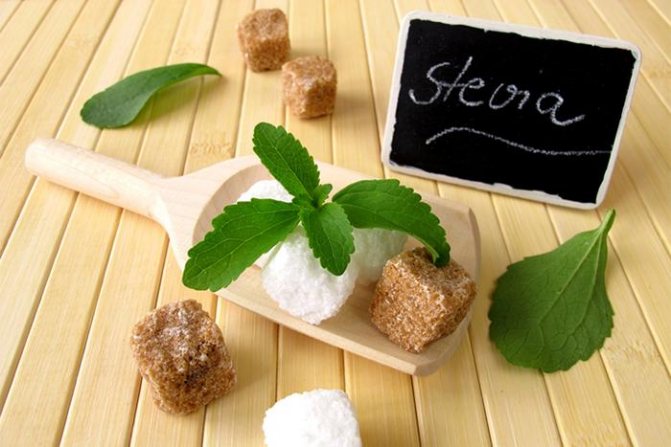
Sweeteners during breastfeeding
When sugar is prohibited for consumption, you need to find something to replace it with. After all, without carbohydrates it is difficult for the body to cope with physical and nervous stress.
Fructose
Fructose obtained from fruits and honey is less harmful. It can be consumed in small quantities even by people with diabetes. It is important to monitor the rate of fructose use. This product does not make you feel full, so you can eat a lot of it. It is best to make sweets from fruit sugar than to consume it in its pure form.
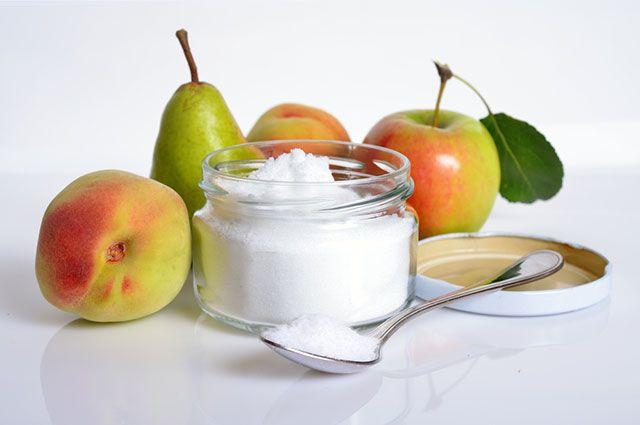
Stevia
This substance is beneficial as a sweetener. It is prepared from a herbaceous plant with a sweet taste. Being 15 times sweeter than sucrose, stevia is very low in calories. The plant contains many antioxidants and vitamins. Sweetener is used in the preparation of confectionery products. The natural sweetener does not cause allergies, so it is recommended for breastfeeding women.
Cane sugar
Unlike beet sugar, cane sugar contains substances that are better absorbed. The product contains B vitamins, zinc, and iron. Brown sugar contains more glucose than sucrose, which is good for brain function. The energy obtained from cane sugar must be spent so that glucose does not accumulate in the body. Therefore, pregnant and lactating women should consume it in a rationed manner.
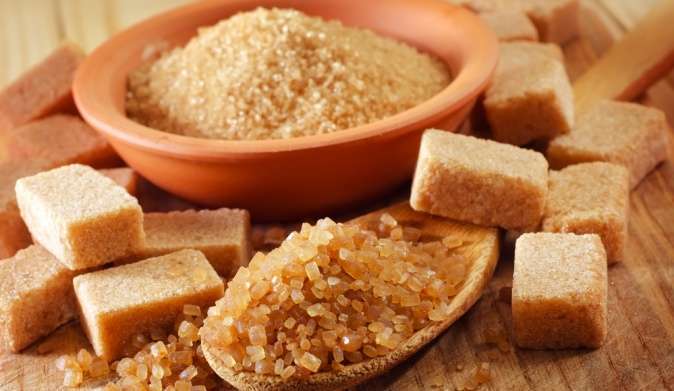
Is it possible to use a sugar substitute while breastfeeding – Mom’s News
The safety of all products that a young mother consumes is the most important criterion that should be adhered to during breastfeeding.
Many of us know how unhealthy white sugar is, but is it possible to use a sugar substitute for breastfeeding that is very different in composition? This is a very complex issue that requires detailed consideration; moreover, not all new mothers know that an analogue sweetener can be dangerous.
What are the advantages and disadvantages of a sugar substitute for breastfeeding?
It is difficult to argue with the fact that ordinary white crystalline sugar is not very beneficial for human health, and this is to put it mildly. The fact is that this product carries a lot of obvious and hidden threats, and also does not contain any useful or nutrients.
In addition, if after giving birth a young nursing mother is overweight, then reducing the consumption of white granulated sugar is not only desirable, but even recommended by doctors.
And in general, in order to stay healthy and have a beautiful figure even after the birth of a child, it is better not to eat more than three teaspoons of sugar per day.
But is this possible when you have to constantly drink teas and warm drinks while breastfeeding?
White sugar is found virtually everywhere - in store-bought dairy products, even in diet or low-calorie cookies. And sometimes it’s even included in vitamins or tablets to make them taste less bitter.
It seems that the only healthy option is to switch to sugar substitutes and artificial sweeteners after you have your baby to reduce the risk of side effects from eating white sugar. And, as you know, sweet drinks, even if it is healthy herbal tea, can greatly bloat the intestines, so during lactation doctors advise not to exceed the daily intake of this product.
Harm of substitutes when breastfeeding a child
However, many nursing mothers do not realize that artificial sugar is no healthier than regular sugar, and sometimes even much more harmful. Yes, it contains fewer calories and is not so harmful to the female figure, but this does not make it safer for the body.
The fact is that many artificial sweeteners have a number of significant and dangerous side effects. Some increase the risk of developing malignant tumors tens or even hundreds of times, others increase appetite, and still others can cause an allergic reaction.
Some types of sugar substitutes are recognized as hazardous to health and are strictly prohibited for consumption by pregnant and nursing mothers, but they still actively appear on sale and appear on supermarket shelves, and not every woman considers it necessary to find out more about the product when buying it in the supermarket.
Before using a sweetener while breastfeeding, you need to make sure that it is approved for use by pregnant women and those who are breastfeeding.
If you do not follow this rule, you can greatly harm not only your own health, but also the well-being of your newborn baby, because most of the dangerous substances easily penetrate into mother’s breast milk.
Artificial sweeteners are especially harmful - for the most part, not a single type is without significant side effects. Therefore, it is better to abandon them immediately, so as not to undermine your health or acquire serious illnesses. Below we will look at this nuance in more detail, and at the same time find out which sugar substitute can be used by a nursing woman and in what dosages.
Synthetic sweeteners when breastfeeding a newborn
As noted above, this type of sweetener is fraught with danger even for an ordinary person, and for a nursing woman this is a completely prohibited product.
Almost all types of sweeteners based on artificial substances have carcinogenic properties - they can cause cancer and the appearance of low-quality tumors.
But the most unpleasant thing is that such harmful chemical components penetrate into the mother’s breast milk, and therefore can reach her baby’s body.
Aspartame is considered the most harmful, although this unnatural sugar substitute is perhaps the most famous and popular.
It has been scientifically proven that aspartame contains carcinogenic substances that can lead to various types of cancer. In addition, this sweetener is toxic - it causes a sharp deterioration in physical condition after consumption, after which you may feel dizzy, and nausea and lightheadedness often develop.
But it’s not only aspartame that is harmful and prohibited for a nursing mother.
Saccharin and suclamate are products that are artificial sugar substitutes that are toxic to the human body and interfere with its functions.
In addition, scientists warn that this category of unnatural sugars is not able to be absorbed by the human digestive tract, and therefore the product remains in the body for a long time and poisons it.
Also, despite the widespread belief that sugar substitutes help you lose excess weight, doctors warn that this is a big misconception and lie.
Very often, store-bought sweeteners not only fail to help in the fight against extra pounds, but also accelerate their formation.
Thus, the artificial sweetener aspartame, among its side effects, also has an increase in appetite.
Natural sweeteners during lactation
Sweeteners in the production of which, for the most part, do not use toxic chemicals, but natural ones, are called natural sugar substitutes. But this does not mean that they are not harmful to the body. It’s just that, unlike artificial ones, they can be consumed by a nursing mother, but only occasionally and in very small quantities.
But it is important to remember that such substances also have side effects. For example, fructose, considered perhaps the most healthy and safe type of sugar, can disrupt the environment inside the body, shaking the acid level.
Natural sweeteners sorbitol and xylitol are substances that can cause severe diarrhea in a nursing mother. Moreover, if this product is abused, the risk of urinary tract cancer greatly increases.
Stevioside, or simply stevia, is the safest sweetener for the health of a young mother, and therefore it can sometimes be used when breastfeeding a newborn.
But even if you use natural sweeteners in small quantities, remember that they are all very high in calories. This means that using them for weight loss will be useless - they contain about the same calories as ordinary white refined sugar.
The safety of all products that a young mother consumes is the most important criterion that should be adhered to during breastfeeding.
Many of us know how unhealthy white sugar is, but is it possible to use a sugar substitute for breastfeeding that is very different in composition? This is a very complex issue that requires detailed consideration; moreover, not all new mothers know that an analogue sweetener can be dangerous.
What are the advantages and disadvantages of a sugar substitute during breastfeeding?
It is difficult to argue with the fact that ordinary white crystalline sugar is not very beneficial for human health, and this is to put it mildly. The fact is that this product carries a lot of obvious and hidden threats, and also does not contain any useful or nutrients.
In addition, if after giving birth a young nursing mother is overweight, then reducing the consumption of white granulated sugar is not only desirable, but even recommended by doctors.
And in general, in order to stay healthy and have a beautiful figure even after the birth of a child, it is better not to eat more than three teaspoons of sugar per day.
But is this possible when you have to constantly drink teas and warm drinks while breastfeeding?
White sugar is found virtually everywhere - in store-bought dairy products, even in diet or low-calorie cookies. And sometimes it’s even included in vitamins or tablets to make them taste less bitter.
It seems that the only healthy option is to switch to sugar substitutes and artificial sweeteners after you have your baby to reduce the risk of side effects from eating white sugar. And, as you know, sweet drinks, even if it is healthy herbal tea, can greatly bloat the intestines, so during lactation doctors advise not to exceed the daily intake of this product.
Harm of artificial sugar during breastfeeding
However, many nursing mothers do not realize that artificial sugar is no healthier than regular sugar, and sometimes even much more harmful. Yes, it contains fewer calories and is not so harmful to the female figure, but this does not make it safer for the body.
The fact is that many artificial sweeteners have a number of significant and dangerous side effects. Some increase the risk of developing malignant tumors tens or even hundreds of times, others increase appetite, and still others can cause an allergic reaction.
Some types of sugar substitutes are recognized as hazardous to health and are strictly prohibited for consumption by pregnant and nursing mothers, but they still actively appear on sale and appear on supermarket shelves, and not every woman considers it necessary to find out more about the product when buying it in the supermarket.
Before using a sweetener while breastfeeding, you need to make sure that it is approved for use by pregnant women and those who are breastfeeding.
If you do not follow this rule, you can greatly harm not only your own health, but also the well-being of your newborn baby, because most of the dangerous substances easily penetrate into mother’s breast milk.
Artificial sweeteners are especially harmful - for the most part, not a single type is without significant side effects. Therefore, it is better to abandon them immediately, so as not to undermine your health or acquire serious illnesses. Below we will look at this nuance in more detail, and at the same time find out which sugar substitute can be used by a nursing woman and in what dosages.
Natural sugar substitutes during lactation
Sweeteners in the production of which, for the most part, do not use toxic chemicals, but natural ones, are called natural sugar substitutes. But this does not mean that they are not harmful to the body. It’s just that, unlike artificial ones, they can be consumed by a nursing mother, but only occasionally and in very small quantities.
But it is important to remember that such substances also have side effects. For example, fructose, considered perhaps the most healthy and safe type of sugar, can disrupt the environment inside the body, shaking the acid level.
Natural sweeteners sorbitol and xylitol are substances that can cause severe diarrhea in a nursing mother. Moreover, if this product is abused, the risk of urinary tract cancer greatly increases.
Stevioside, or simply stevia, is the safest sweetener for the health of a young mother, and therefore it can sometimes be used when breastfeeding a newborn.
But even if you use natural sweeteners in small quantities, remember that they are all very high in calories. This means that using them for weight loss will be useless - they contain about the same calories as ordinary white refined sugar.
So can a nursing mother use sugar substitutes?
Yes, you can sweeten drinks and dishes with sugar substitutes while breastfeeding, if they are natural and you use them infrequently and in small quantities. You can eat stevia and fructose, but the latter has its own number of side effects that are important to be aware of.
As for artificial types of sugar, everything is obvious here - a nursing woman should not add them, and a non-breastfeeding woman should not add such dangerous products to her menu, especially if you care about your health and want to reduce the risk of cancer.
Source: https://parents-news.ru/materinstvo/mozhno-li-zamenitel-sahara-pri-grudnom-vskarmlivanii.html
Harm of artificial sweeteners
If natural sweeteners can be consumed during lactation, then artificially created ones should be excluded from the menu:
- Aspartame is dangerous because it turns into methyl alcohol. This poison causes poisoning in mother and baby.
- Sorbitol and xylitol cause diarrhea. Abuse of sweeteners leads to urinary tract cancer.
- Suclamate and saccharin are dangerous for the body of women and babies, as they contain toxins.
Artificial sweeteners are poorly excreted from the body, so they accumulate in it and gradually poison it.
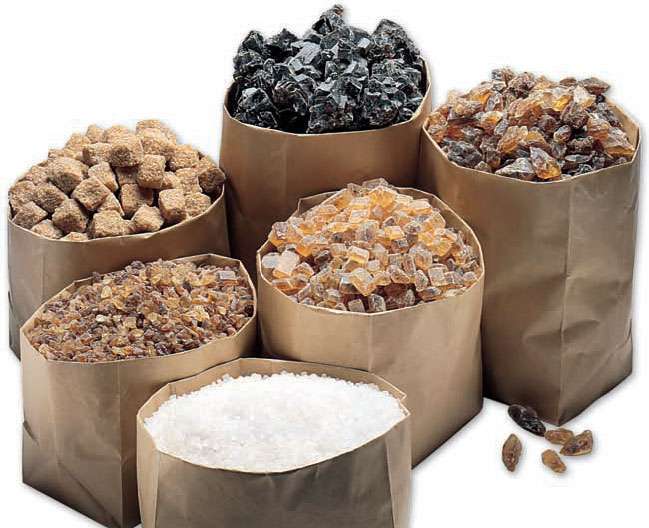
Recipes for sweets made from natural sweeteners
Natural sugar substitutes are available for women who are breastfeeding. But it is better to replace pure fructose by preparing delicious products from it.
Halva with fructose
The oriental sweet is prepared like this:
- First, grind half a glass of roasted sunflower seeds.
- Pass flour in an amount of 1.5 cups until brown, mix with seeds.
- Make syrup from 1 fruit sugar by adding 700 milliliters of water.
- After 5-10 minutes of boiling over low heat, pour in 150 milliliters of sunflower oil.
- Remove from heat, add mixture of seeds and flour, stir thoroughly.
- Place in a mold and cool for 4 hours.
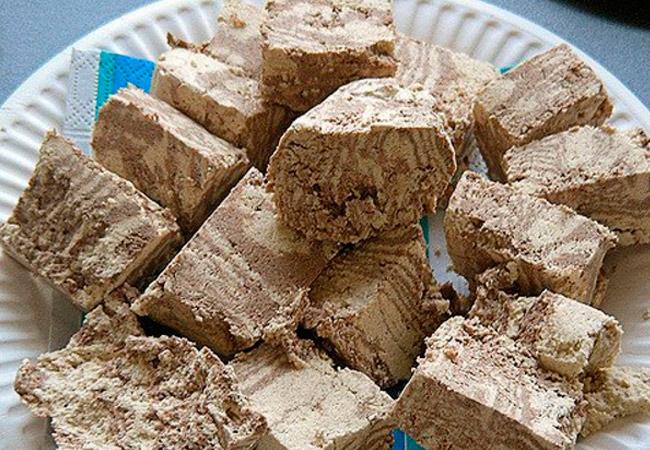
Cut the finished mass and serve it to the table.
